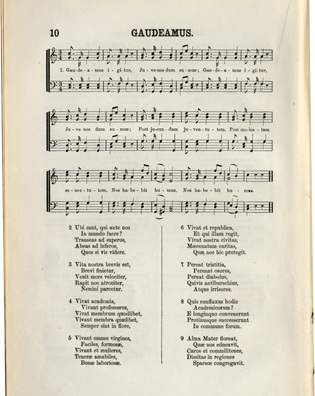 loading
loading
Old YaleFor a SongJudith Ann Schiff is chief research archivist at the Yale University Library.  Manuscripts & ArchivesSheet music of the best-known student song in Europe. View full image"No College in the country has such a variety of songs as we," boasted the Yale Literary Magazine in 1855. "Other Institutions have not that exuberance of good feeling that prompts the Yalensian to vent in quaint, and sometimes uncouth rhymes, the glee of the heart." The first college songbook in the United States was Songs of Yale (1853), and Yale College still has a particularly strong tradition of avocational a cappella. There are currently at least 15 undergraduate singing groups. The Yale Alumni Chorus, a post-graduate singing group founded in 1998, has 450 active members. The person with the best claim to having started Yale's singing tradition is Richard Willis, Class of 1841, probably the first professional musicologist to graduate from Yale. Another Yale singer of the era, Edward C. Porter ’58, credited him with even wider influence. Porter wrote that, thanks to "Gaudeamus," an especially popular drinking song that Willis had brought over from Germany, he "awoke the spirit of college music among the students of America." Born in 1819, Willis was the brother of the noted poet Nathaniel Parker Willis ’27. His sister Sara became famous as the novelist and newspaper columnist "Fanny Fern." While at Yale, Richard Willis became president of the Beethoven Society, forerunner of the Glee Club and the only singing group at Yale in that time. He enriched the musical quality of college life by composing vocal and instrumental music. At his commencement in 1841, Willis delivered an address in which he derided what he called "head-music, or . . . ear-music" and passionately defended its opposite, "heart-music." The latter, he said, was, "in accordance with its heavenly origin, the most perfect and expressive of all languages." After graduation, Willis went to Germany for several years to study. He spent one summer, his 50th reunion book noted, "in company with Mendelssohn. The great composer reviewed some of the work Mr. Willis had done . . . , and revised his compositions." Willis returned to America in 1848 to teach music and German in New Haven. He brought with him a book of German student songs and introduced Yale students to many traditional songs from Germany, including "Lauriger Horatius" (whose melody was used for "O Tannenbaum" and "Maryland, My Maryland"). Willis also continued to compose his own music. During the Civil War he won a prize for the song "Anthem of Liberty." One of his compositions -- the music for the carol "It Came Upon the Midnight Clear" -- was one of the most popular songs of 1850 and is still well known today. "Gaudeamus" is the first piece in the 1853 Songs of Yale. The song was very well known in Europe. Johannes Brahms used it as the finale of his orchestral medley of student songs, the Academic Festival Overture (premiered in 1881). Bayard Taylor, a travel writer who spent time with Willis in Frankfurt, conveyed the song's significance to German students in his Views Afoot, or Europe Seen with Knapsack and Staff (1846). At the funeral of a University of Heidelberg student, he wrote, the student mourners, "tossing their torches up into the air, cast them blazing into a pile; while the flame and black smoke rose in a column into the air, they sang in solemn chorus, the song 'Gaudeamus igitur,' with which they close all public assemblies." The song is still widely familiar in European universities today. It has been largely forgotten in the United States (though it was once sung in an episode of the television show The West Wing). Translations and adaptations of "Gaudeamus" are numerous. The first two lines are best known: "Gaudeamus igitur, Juvenes dum sumus" ("Let us rejoice therefore while we are young"). The fourth edition of the Yale songbook, published in 1860 by Edward C. Porter ’58, was the first to include an English translation. It was in the dedication to this edition that Porter saluted Willis and "Gaudeamus" for inspiring U.S. college students to sing. The 1860 translation, by Lucius W. Fitch ’40, who added two stanzas of his own to the original seven, is the best known. It moderates the song's drinking theme and bowdlerizes the fifth stanza, on the qualities of women. Fitch's translation is: Life to all the maidens fair,
The Latin was bawdier, as a rough translation shows:
Long live all girls, "Gaudeamus" bears out the Lit's assessment of the undergraduate population. It apparently had just the right combination of quaintness and uncouthness to appeal to Yale students of the time.
The comment period has expired.
|
|